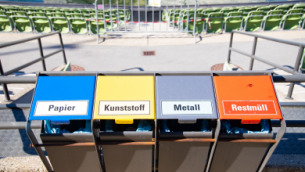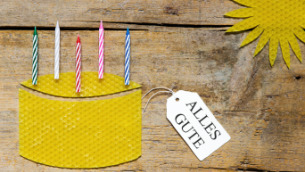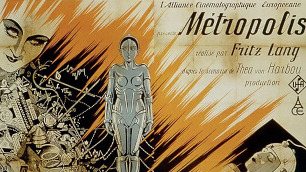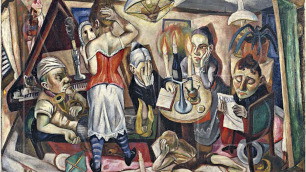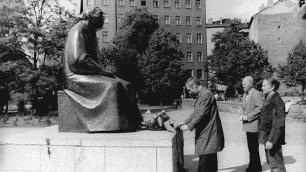Ich bin ein Berliner
The first German course you can't fail!
| Jana: | Hallo and welcome to our listeners! |
| Michael: | Willkommen! Welcome, everyone, to GUTS: Get. Up. To. Speed… in German! |
| Jana: | Danke, Michael. I like the name of this series. Our goal here is to start at zero German and then end with the ability to continue as a regular listener of “News in Slow German for Beginners”. We'll start slow and will gradually pick up the pace as we go. In fact, after just today’s lesson, we promise you… yes, PROMISE you that you will be able to understand an entire paragraph in German through the magic of cognates and learning just two simple verbs. Sounds impossible? Here is a quick peek at what we can do: Berlin ist eine historische internationale Metropole, notorisch für eine dynamische und energetische Atmosphäre. |
| Michael: | Wow! Oh I see, you are right, anyone can figure this out: Berlin ist means Berlin is… |
| Jana: | … eine historische internationale Metropole … |
| Michael: | …a historical international metropolis. Perfekt! |
| Jana: | … notorisch für eine dynamische und energetische Atmosphäre. |
| Michael: | …famous for its dynamic and energetic atmosphere. Jana, this really is easy! What may seem like an impossible challenge is actually within reach, now we know we can do it! |
| Jana: | Well, we just saw from our example how closely German and English are related… and here is the data: We should tell our listeners that they actually already know over 6% of words in the German language! |
| Michael: | Are you ready? Let’s buckle up for our trip. |
| Jana: | Oh great, that’s exactly what I had in mind. We are going to take a trip through Germany, learn about history, culture, music, and food, increasing our vocabulary as we go. |
| Michael: | And since we start at zero, do you know what else I am wowed by? |
| Jana: | No, but I’m sure you will tell me. |
| Michael: | Did you notice how similar a lot of the words from our example sounded? |
| Jana: | Yes, the basics of German are easier than you would think. This is because our Indo-European roots provide us with many similarities. |
| Michael: | And we have many common words that are actually exactly the same, but pronounced slightly differently. |
| Jana: | Like… Hammer, hammer! |
| Michael: | Hand, hand. |
| Jana: | Sofa, sofa. |
| Michael: | Ideal, ideal. |
| Jana: | Those are great examples as they help us see how the vowels are pronounced, for instance a sounds like ah, and o sounds like the o in hello. |
| Michael: | Well, not exactly like hello, it’s a short o sound: Hallo! |
| Jana: | Yes, you're right! Hello… Hallo! Lastly, the German letter i sounds like an e. |
| Michael: | I like to use the word Iglu as a reminder. We have that word in both languages, but it shows an English speaker a different use of the i. |
| Jana: | Oh, elegant… I mean, elegant (laughing). The u also sounds different, we say Bus instead of bus, fundamental instead of fundamental, absurd instead of absurd. |
| Michael: | I have another great mnemonic device: We can just think of the word kaputt. It’s a German import and still pronounced exactly the same way as in German. |
| Jana: | And then there are words that are still written the same way but might sound even more foreign, like Student, which is the same as student but one of those instances where the s sounds like sh. |
| Michael: | Yes, almost every time when an s is followed by at t or p it will turn into sh, like Sport or Stress. |
| Jana: | Super! See? German is so much fun, and aside from the identical words there are a lot of cognates – words that you can recognize immediately because they have the same root. |
| Michael: | Oh yeah! Are you ready for this? I have some great nouns here that I am sure are easy to guess: Garantie, Kritik, Resource. |
| Jana: | Guarantee, critique, resource. There are some endings in German that can help us see a pattern… |
| Michael: | Wait, like these? Aktion, Reaktion, Fiktion, Emotion, Organisation, Station, Imitation, Faszination ... |
| Jana: | Wow! OK, Michael! I think our listeners get it. All of these nouns end with -tion. It’s again similar to English but just pronounced differently. |
| Michael: | And there are many more! |
| Jana: | But there are also other cognate nouns with different endings. We will explore that in episode 3. |
| Michael: | Well, it almost feels like we can say: When in doubt, pronounce the English word the German way, and see if people will understand. |
| Jana: | Yes, it's always good to be playful! And I want to quickly point out that we can see in your examples that German nouns are always capitalized. |
| Michael: | Ja. By the way, when you just said playful, I thought we should mention another unique thing about the German language. |
| Jana: | And what would that be? |
| Michael: | The fact that German is a lego language! You can build your own words… just like legos! I would like to entertain our listeners with my favorite word: Rindfleischetikettierungsüberwachungsaufgabenübertragungsgesetz. |
| Jana: | You can say that again! |
| Michael: | Of course. Rindfleischetikettierungsüberwachungsaufgabenübertragungsgesetz! |
| Jana: | Oh yes, we have some very unusual compound words. This one translates to: Beef labeling regulation and delegation of supervision law. But Michael, let’s try not to scare anyone off, that really is an extreme case and a very common joke among Germans to make fun of our bureaucracy. |
| Michael: | OK, sorry. I thought it would be a great example to warm up to our poetic language! |
| Jana: | But it was definitely funny and you are right that we can often break words apart to discover their literal meaning. For example: Zeitgeist. Zeit means time and Geist can be translated as ghost or rather spirit in this context. Put it together and you get: The spirit of our times. |
| Michael: | Right, I mean you can go straight into a philosophical discussion with the term Geist, as well as our other famous export Gestalt. |
| Jana: | Oh danke, Michael, that is another wonderful reason to learn German! |
| Michael: | You are welcome. Of course there are also ugly words like Schadenfreude, which can be taken apart again: Schaden means damage, and Freude means happiness. |
| Jana: | Oh well, I don’t really like that one. But let’s stay with well-known words. Here is a word that I find fascinating: Doppelgänger. And it perfectly demonstrates the use of the ä, one of our strange vowels called Umlaut. |
| Michael: | Isn’t it funny that the Germans coined that term Doppelgänger? Such a weird concept. Anyway, I have an example for the Umlaut ü: The word Büro means office, and the ü is similar to the u in the English word bureaucracy. |
| Jana: | Great and for the last Umlaut we can use a newsworthy word: Mörder is closely related to murderer and the English pronunciation can help our listeners remember what the ö sounds like. |
| Michael: | I have one more vowel that is pronounced differently. It’s the letter y, or Ypsilon in German. Here is my word: Analyse. |
| Jana: | Great example. In English the y can sound like an i or e, but in German it always sounds like the Umlaut ü, Analyse. It’s the German word for analysis, and here the English pronunciation of the y is actually very similar to German: Analysis. |
| Michael: | Good explanation. OK, so our full paragraph in German is coming up at the end, but we have one more thing to cover first. |
| Jana: | Some of the most important irregular verbs. Sein. |
| Michael: | To be. Wait, I have a great example, I bet our listeners know this famous line: Ich bin ein Berliner! |
| Jana: | Perfekt! Yes, that is how you say: I am a Berliner. Just like in English we cannot say: I be a Berliner, but as we conjugate this irregular verb it changes… just like in English! Here is the complete list: ich bin – I am du bist – you are er, sie, es ist – he, she, it is |
| Michael: | And for the plural: wir sind – we are ihr seid – you are sie sind – they are or you are |
| Jana: | Right, that last one may sound confusing at first, but as in many Romance languages, German also has a formal way to address grownups. We will talk more about this in Episode 1. |
| Michael: | What about the verb haben? That does sound like it is related to the English verb to have. |
| Jana: | Yes, both verbs come from the same origin and haben is also irregular: Ich habe – I have Du hast – you have Er, sie, es hat – he, she, it has |
| Michael: | Wir haben – we have Ihr habt – you have Sie haben – they have and you have |
| Jana: | Michael, let’s tell our listeners they can do this, that they have potential: Sie haben Potential! |
| Michael: | Speaking of potential, it's time for everyone to have their final "wow" moment! Here's an entire paragraph in German that you can already understand! |
| Jana: | Ja bitte! |
| Michael: | Hier ist der Paragraph: Ich bin ein Berliner. Du bist ein Berliner Wir sind alle Berliner. Haha! |
| Jana: | Das ist zu simpel. Let’s build upon what we said at the beginning of the episode: Ich bin ein Berliner. Berlin ist eine historische internationale Metropole, notorisch für eine dynamische und energetische Atmosphäre. Extravagante Bars, romantische Restaurants, moderne Galerien und eine florierende Musikszene sind symbolisch für die Berliner Kultur. Sie ist eine Inspiration im globalen Kontext. Soziale und multikulturelle Integration parallel zur Tradition sind hier die optimale Motivation für universelle Qualität. |
| Michael: | Cool! Let's repeat that one more time… Ich bin ein Berliner. Berlin ist eine historische internationale Metropole, notorisch für eine dynamische und energetische Atmosphäre. Extravagante Bars, romantische Restaurants, moderne Galerien und eine florierende Musikszene sind symbolisch für die Berliner Kultur. Sie ist eine Inspiration im globalen Kontext. Soziale und multikulturelle Integration parallel zur Tradition sind hier die optimale Motivation für universelle Qualität. |
| Jana: | Do you see all the cognates? |
| Michael: | Amazing! Inspiration … Motivation! Exactly what our listeners need. |
| Jana: | Right? German is easy… well sort of. |
| Michael: | And that’s a great way to end this. As we start our journey now, I will add one more sentence: Ich bin ein Tourist. I am ready for this journey and for discovering everything with new eyes. Jana, I am ready for the Autobahn! Let’s go! |
| Jana: | Great, we’ve got 25 stops along the way. So let’s get up to speed! |






